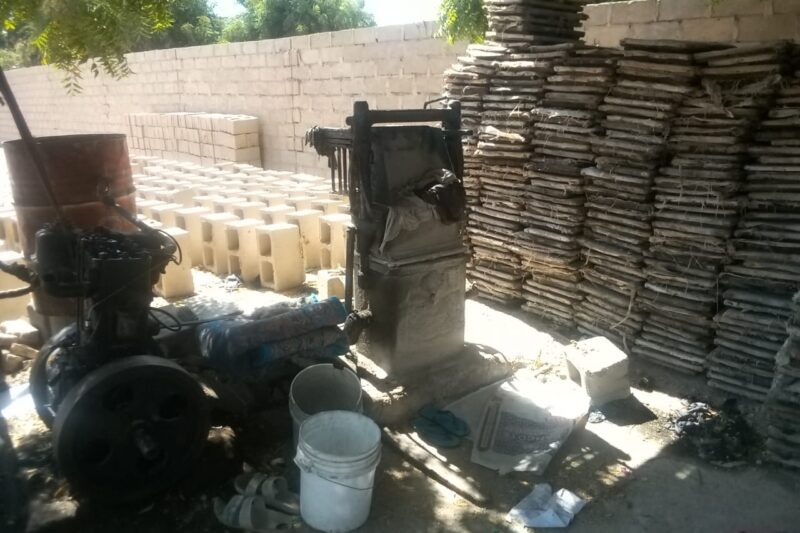Skyrocketing price of cement is affecting the lives of manufacturers of building blocks, their labourers and bricklayers as they are losing their jobs and are unable to provide for their families.
Nigeria is the largest cement producer in Africa but since July 1 last year when President Bola Tinubu withdrew the fuel subsidy – which resulted in the price of all commodities soaring to new heights and caused a cost-of-living crisis – the price of cement has also skyrocketed.
The increase was compounded by the record-high inflation rate – 28.9% in November, the highest since August 2005 – and the ever-declining value of the naira.
The fluctuating price of cement has taken its toll on the construction industry and it is making it even harder for ordinary Nigerians to build their own houses.
Two years ago, the price of a 50kg bag of cement used to cost between ₦2,500 and ₦3,000. Now the same bags cost between ₦6,500 to ₦7000.
This has shattered the hopes and dreams of many Nigerians who planned to build their own homes because they simply cannot afford to buy cement blocks anymore.
And the high prices have resulted in a large number of cement block manufacturers, their labourers and bricklayers losing their income, putting their families at risk of going hungry and their children not being able to attend school.
“Two years ago, we paid about ₦2,500 to ₦3,000 for a 50kg bag of cement. But now it costs about ₦7,000,” said Ba’ana Yaye a block manufacturer and supplier.
He said the rising cost of cement had significantly affected manufacturers and those who worked for them.
“Many of our colleagues have already shut down their businesses. They were forced to close shop because they simply could not afford to continue producing cement blocks. They were losing money instead of making a profit.”
Yaye said the cement price hike was affecting the construction industry. Far fewer people were buying cement blocks because the price was out of reach. The price of each cement block used to cost ₦150, now one block costs ₦300.
He said the result was that ordinary people had either stopped or suspended their building projects.
“Some cement block producers even compromised the quality and quantity of their blocks to avoid increasing the price so that they would not lose customers.”
Baba Mala, a manager of another cement block manufacturer, said: “In the past, we used to produce and sell between 1,500 to 2,000 blocks a day. But, with the inflated prices, now we sell about 200 blocks on a good day. Many times, we sell as few as 120 a day. Sometimes none.
“We used to buy cement in the past at ₦3,500 per bag but now it costs at least ₦6,700 per bag.
“Before, in just one day, we used 12 to 13 bags of cement to produce the blocks we needed, but now we use two to three bags a day. And sometimes we don’t produce any blocks in a day. We produce blocks only on request.
“We are pleading with the government to find a solution to this problem so that we can sell cement blocks to people at an affordable price. We have all lost customers.”
Bunu Usman, a labourer who works for a cement block manufacturer, told RNI that the rising prices of cement had affected livelihoods.
“We find it very difficult to feed our families. We are labourers and we get paid only if we make the blocks. It was good work when the demand was high but now the demand is low and we no longer produce blocks every day. The manager asked us to stop coming in every day because there is no work. He said he would call us if there was work.”
“I am a family man and I find it difficult to feed my wife and children, let alone send my kids to school,” said Ali Musa, also a labourer at a cement block manufacturer.
“We used to make blocks every day. We were so busy. It was non-stop for four or five months. Now we go for a week, sometimes two, without making one cement block.”
Bricklayers have also been badly affected by the price of cement because the building industry in many areas has dried up and projects they were working on have either been suspended or stopped.
Gajirima Audu, 38, said: “We find it difficult to get contracts because the huge hike in the price of cement has stopped people from starting, continuing or even finishing building projects. The result is that now we are all out of work.
“These days, with the way prices of food and other commodities are increasing daily, it is difficult for someone like me to feed my family or me. Being a bricklayer is a menial job, but at least we could make enough cash to feed our families and send our children to school.
“I have two wives and nine children. I am a bricklayer and I do not know if I am going to get work from one day to the next. It fluctuates. Sometimes I do not get any work for a week or two, sometimes even longer. How am I supposed to support my family?”
AYSHA MUSTAPHA KOLOMI








